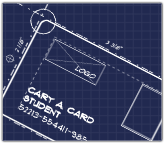A long-established campus card provider brings a “NuVision” to card program security
Take one computer science professor, add another versed in identification card technology, and the result is a university card system that its president calls one of the most secure in the country. And in this world of hackers and ID theft, a highly secure system brings a lot to the table.
“We’re the second oldest company in the business; only one company has been around longer, ” said William Adoff, president of NuVision Networks Corp. (NVN) which is servicing colleges and universities from California to Maine and Minnesota to Florida with its iAMECS Advanced One Card System.
“We are unique in the (student card) industry because our entire business is One Card Systems,” he said. “Other companies may be larger than NVN, but no other company is specifically focused on this market.”
The company got its start 20 years ago when Bob Roth, the CEO, was a consultant working with IDenticard helping to develop an access monitoring control system. He bought the product from IDenticard while he was in Pennsylvania, then moved his new company, called Roth Systems, to Napa, California. What was then called AMECS was the first DOS-based program to be completely icon driven.
At that time, Mr. Adoff was an Auxiliary Services Director at the University of the Sciences in Philadelphia, where he was using the original AMECS system and had developed a working relationship with Mr. Roth. Mr. Adoff later became a computer science professor at Philadelphia University before leaving to join Roth Systems, now called NuVision Networks. Today, the corporate office is in Napa, Mr. Adoff runs the East coast office from New Jersey and the technology area is still in Lebanon, Penn.
“When we first started in this business,” said Mr. Adoff, “a one-card was simply a meal plan program and our customer was food services. Back then systems were used to replace the numbers listed on a paper or a punch card. Today our customer uses iAMECS Advanced for virtually anything on campus that controls money, privileges, access and much more.”
With NuVision’s initial clients coming from the foodservice area of the College, “we knew it would be a better transition for them to use an icon driven system, rather than a DOS system,” he said, explaining what led to the development of AMECS, which stands for Access Monitoring Eligibility and Control System. Once it migrated to the Internet, it became iAMECS.
“We were the first company, to have a Windows product, called WinAMECS. We have always kept AMECS in our name. And when the Internet became popular we became the first company to go there.” Mr. Adoff added: “All system and software development is done in-house. Because top management is comprised of computer science people it would be silly to have our software written by someone else. This is one of the things that sets NVN apart.”
There are other things as well, he said. “We have the only One Card System that uses AES 256-bit encryption along with Packet-Lok, which makes us the most secure system in existence.” This high security extends to all NVN components including wireless, and even vending readers. As a former computer science professor, Mr. Adoff said he understands security. “Since college computer science departments have to teach network basics, anything running on the college system must consider security a must.”
“At NVN, we don’t believe that any college should be forced to change the way they do things for the sake of their One Card System. iAMECS Advanced is built to be modified. We take a vanilla system and make it work for the college the way they need it to work, and we do it without charging extra money,” he said.
NuVision also incorporates internal Video Imaging and ID card production, web portal, and POS software into its One Card System, eliminating the need for third party vendors. It naturally handles meal plans, determining a student’s eligibility, etc., but it also includes accounting, ticketing, general access, voting, equipment checkout and “with our Campus Center products, we even have parking modules and off campus shopping,” he said.
NVN’s off-campus program, Campus Center, has its own features. “We wanted a way for a client to have an off-campus presence without spending any extra money for hardware,” said Mr. Adoff. “A student can order pizza online and have it all done electronically with no additional cost. The business never sees the student’s ID number. The order is faxed in with a picture so they know it’s the right person when they deliver the pizza. We’ll even create a report for the college that shows how much money is owed to the business. What’s nice is that it doesn’t cost anything. It comes with the system. There are no licensing fees. You can make arrangements with one company or a hundred companies to handle the off-campus shopping.”
While NuVision doesn’t directly provide physical and logical access control, a partnership with Compass Technologies, a manufacturer of access control systems, gives it that expertise.
“We decided we didn’t want to write our own access control program, in terms of door access,” said Mr. Adoff. “We went looking for a company with a good product we could work with. We developed interconnections with Compass. We even handle the access levels. To the user it’s seamless, invisible.”
“The strategic partnership with Compass, located in Exton, Penn., allows for a fully integrated “One Card” solution providing both patron accounting and physical access control, said Mr. Adoff. NuVision’s iAMECS Advanced One Card system provides campus data management, accounting, and meal plan control that integrates with Compass Technologies’ campus door access. “Compass’s strong business partner network insures that clients have a local source for the access control portion of the system, which is so essential,” said Mr. Adoff.
This partnership has led to other opportunities. “For example, NuVision is now working with two Pennsylvania colleges to allow students at Haverford College and Bryn Mawr College, both near Philadelphia, to use their student cards at either school, ” said Mr. Adoff.
“We have software-partitioned our data so Bryn Mawr can only administer Bryn Mawr students and Haverford can only administer Haverford students,” he added. “We are the data link between both schools. Bryn Mawr uses PeopleSoft as their student information system and Haverford uses their own in-house system. Further, Bryn Mawr uses our partner, Compass Technology, while Haverford uses a different company. All data flows through us. If, for example, Haverford puts a student on hold, it stops the student’s card from working both at Bryn Mawr and Haverford in our system and both access control systems. We take care of all the data and the data integration. You have two schools, two different student information systems and two different access control companies with all flowing through one system.”
Finally, he added, “We’ve been around a long time. We use that longevity and stability to our advantage; we have a lot of experience in many different areas. We take all those pieces and make them work together.”



